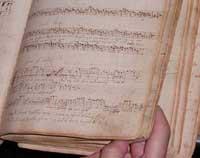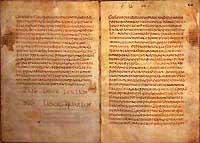Nanoparticles to preserve ancient books
2002/10/22 Orobengoa, Olatz - Elhuyar Zientziaren Komunikazioa

The main problem in preserving old books is acid compounds. The use of acids is essential during paper manufacturing, but over time the pulp fibers of paper feed on these acids and the leaves are yellowed and weakened.
If you want to keep the books it is mandatory to maintain a low level of acidity of the paper. Magnesium oxides are currently used in powder: molecules adhere to fibers and, reacting with water, an alkali is formed that neutralizes acids.
The new method developed by Italian scientists is much cleaner and no water is needed. Calcium hydroxide nanoparticles of 2·10 -4 millimeters in diameter are used. Propanol is mixed with alcohol and the paper is splashed with the mixture. Alcohol evaporates and calcium is between fibers. Gradually it will react with the carbon dioxide present in the air. The reaction produces calcium carbonate, a compound that neutralizes the acidity of the paper.

The slowness of the reaction makes it a sustainable conservation method and, in addition, when alcohol evaporates, does not affect the texts or printed images. Moreover, according to scientists, with the mixture you can rub the paper or put it in alcohol.
Several mixed trials have already been carried out, having managed to neutralize acids in all paper samples, without generating any negative reaction.

Gai honi buruzko eduki gehiago
Elhuyarrek garatutako teknologia




